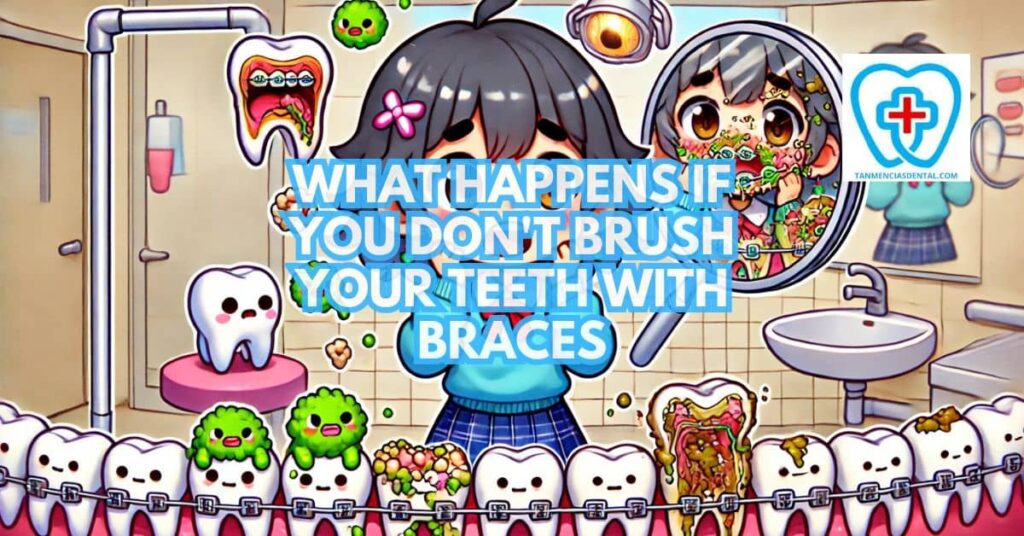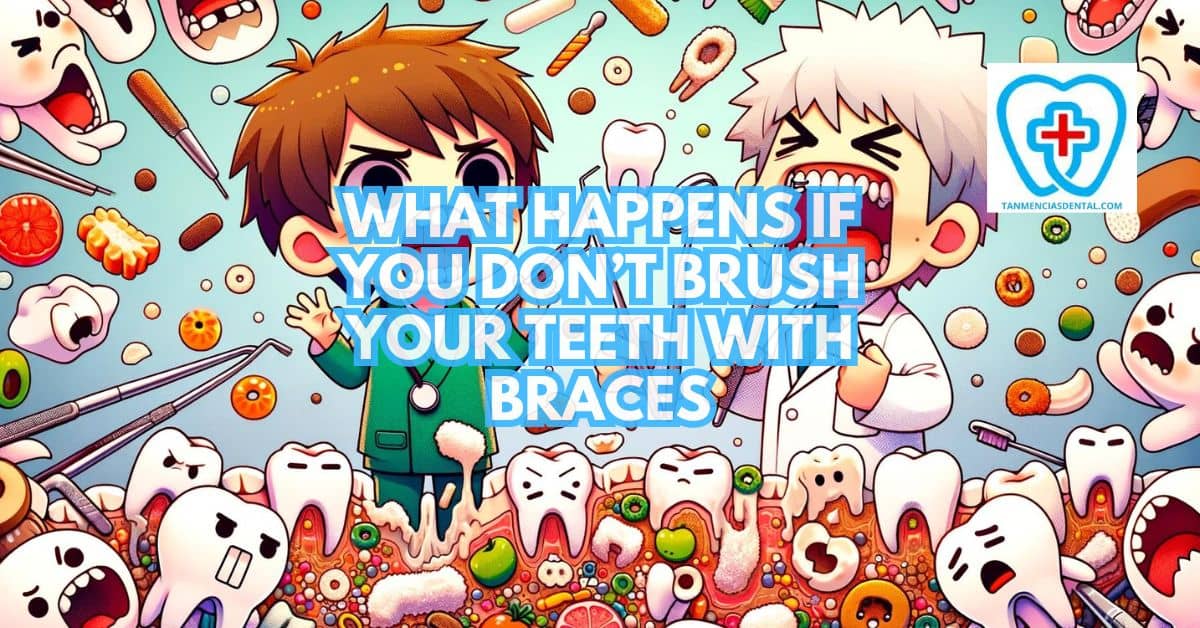Braces create extra spaces where food and plaque can hide, so it is important to keep your teeth clean.
We’ll explain what happens if you don’t brush your teeth with braces.
Skipping proper brushing can lead to cavities, gum disease, bad breath, and even damage to your braces.
These problems may extend your treatment time and cause discomfort.
By brushing every day, you help keep your smile healthy and your braces working well.
1. Braces: Food Traps and Plaque Magnets
Braces can easily trap food particles between wires and brackets, making it harder to keep your teeth clean.
If these food particles are not removed, they can turn into plaque, which is a sticky layer of bacteria that can damage your teeth and gums.
This buildup happens if you have braces because the brackets create small spaces where food can get stuck.
Over time, plaque can lead to cavities, bad breath, and even gum disease if it is not properly cleaned away.
To prevent this, you should brush after every meal, making sure to clean thoroughly around the brackets and wires.
Using special orthodontic toothbrushes or flossing tools can help reach difficult spots that regular brushes might miss.
Staying consistent with your cleaning routine will keep your teeth healthy while you wear braces.
🦷 Can Crowns Get Cavities? What You Need to Know About the Risks and What You Can Do
2. Brushing Neglect = Cavity Threat
Failing to brush your teeth with braces increases your risk of developing cavities.
Food particles and plaque that linger on your teeth can erode the enamel.
This erosion creates small holes, known as cavities, which can lead to further dental complications.
Cavities can cause pain and require fillings or other dental treatments.
Keeping up with your brushing routine helps protect your enamel and prevent cavities.
🦷 Which Dentist Does Implants? How to Pick the Right One for You
3. From Gingivitis to Periodontitis: Gum Disease on the Rise
Poor oral hygiene with braces can cause your gums to become red, swollen, and irritated, a condition known as gingivitis.
If you do not clean your teeth and braces properly, plaque can build up around each bracket, making it easier for bacteria to grow.
In time, untreated gingivitis can develop into periodontal disease, which affects the gums and the bone that holds your teeth in place.
As the disease worsens, the gums may start to pull away from the teeth, creating deep pockets where more bacteria can collect.
This can lead to tooth loss, infections, and other serious problems that require professional treatment.
To prevent these issues, it is important to brush and floss carefully every day, making sure to clean around each bracket and along the gumline.
Visiting your dentist regularly for checkups and professional cleanings can also help keep your gums healthy and free from disease.
🦷 Can Teeth Whitening Trays Get Rid of Deep Stains? Let’s Take a Look
4. Unsightly Souvenir: Permanent White Spots
Neglecting to brush your teeth with braces can lead to the formation of permanent white spots on your teeth.
These spots are early signs of tooth decay and demineralization.
Once the braces are removed, these white spots remain, marring the appearance of your smile.
They are difficult to treat and often require professional dental care to improve.
Regular and thorough brushing helps prevent these unsightly white spots.
🦷 Dental Nurse vs. Dental Hygienist: Which Career Path is Right for You?

5. Fresh Breath? Not with Braces and Poor Hygiene
Poor brushing habits with braces can quickly lead to bad breath because food gets trapped between wires and brackets.
If you do not clean your teeth properly, these food particles can break down and release a foul odor.
Plaque buildup on your teeth and braces also causes bacteria to grow, which makes your breath smell even worse.
To prevent this, you should brush at least twice a day, making sure to brush the top, bottom, and sides of each tooth.
It is also important to clean carefully around the brackets and wires where food and plaque can hide.
After brushing, rinse your mouth with water to wash away any remaining food and bacteria.
Keeping up with good oral hygiene will help you maintain fresh breath and a healthy smile while wearing braces.
🦷 How Teeth Whitening Foam Can Work Wonders for Your Smile in Just Minutes
6. Brushing Your Way to a Longer Treatment?
Not brushing your teeth properly can prolong your orthodontic treatment.
Dental issues like cavities and gum disease can delay the progress of your braces.
These complications may require additional dental visits and treatments, extending the time you need to wear braces.
Consistent oral hygiene is key to ensuring your treatment stays on track.
By taking care of your teeth, you can achieve your desired results faster.
🦷 Boost Your Confidence with Prosthodontic Treatments in Marikina
7. Brace Removal Roadblock: Excessive Plaque Buildup
Excessive plaque buildup can make it difficult for your orthodontist to remove your braces.
The hardened plaque, or tartar, can cling to your brackets and wires.
This may require additional cleaning sessions before braces can be safely removed.
Excessive plaque can also damage your teeth and gums, complicating the removal process.
Regular brushing helps prevent plaque buildup and ensures a smoother brace removal experience.
🦷 Why Can Flossing Hurt Your Gums? Busting Some Common Myths
8. Braces Under Attack: Potential for Damage
Failing to brush properly can damage your braces.
Plaque buildup can weaken the adhesive that holds the brackets to your teeth.
This can cause brackets to come loose, disrupting your treatment plan.
Loose brackets may need to be reattached, leading to additional orthodontic visits and delays.
Proper brushing helps maintain the integrity of your braces and keeps your treatment on schedule.
🦷 Dentist vs. Dental Surgeon: What’s the Difference for Your Oral Health?
9. Beware the Cost of Skipping Brushing
Neglecting oral hygiene with braces can lead to costly dental treatments.
Cavities, gum disease, and other issues can require expensive procedures to fix.
These treatments can include fillings, professional cleanings, and even extra orthodontic work.
Regular brushing helps avoid these unnecessary expenses and keeps your dental costs down.
Investing time in proper oral care now saves you money in the long run.
🦷 Can Dental Cleanings Harm Your Teeth? Here’s What You Should Know
10. Brushing, Flossing, and Fluoride: Your Braces Besties
To maintain good oral health with braces, brushing, flossing, and using fluoride are essential.
Brushing removes food particles and plaque, flossing cleans between teeth and under wires, and fluoride strengthens your enamel.
These three practices work together to protect your teeth from decay and disease.
Incorporating them into your daily routine ensures your teeth and gums stay healthy.
Consistent care is key to a successful orthodontic treatment.
🦷 Are Electric Toothbrushes Bad for Your Teeth? What You Should Be Aware Of
11. Mouthwash: Extra Help for Keeping Braces Clean
Using an antimicrobial or fluoride mouthwash can help lower the number of germs that gather around your braces.
It works as a useful extra step along with your daily brushing and flossing routine.
The mouthwash also keeps your breath fresh and clean throughout the day.
With its fluoride content, it strengthens your tooth enamel and helps protect against decay.
This simple addition to your oral care routine is especially helpful for cleaning the hard-to-reach areas around your braces.
🦷 Tan-Mencias Cosmetic Dentistry Clinic
👨⚕️ Conclusion
Brushing your teeth with braces is vital for maintaining your oral health.
It helps prevent cavities, gum disease, bad breath, and other dental problems.
By committing to good oral hygiene, you ensure your smile stays healthy and beautiful throughout your orthodontic treatment.
Proper care also helps keep your treatment on track and avoid unnecessary delays.
Remember, a clean mouth is the foundation of a great smile.
😊 Self-Promotion
Looking for top-notch dental care?
Visit Tan-Mencias Dental Clinic in Parang, Marikina City, where our friendly team is dedicated to your smile’s health.
Whether you have questions or need to schedule an appointment, you can easily reach us by calling 9171451074, sending a message through our Facebook page, or using our website’s contact form.
We’re here to make your dental experience comfortable and positive.
Come and see why our patients love our clinic!

